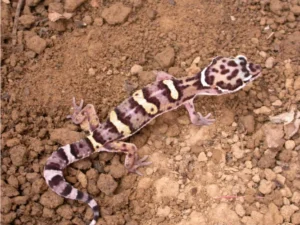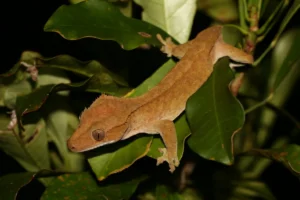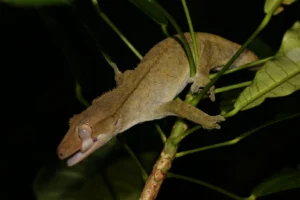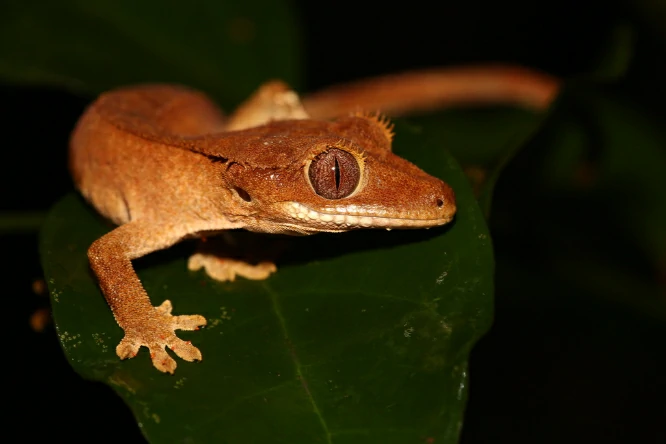It’s a warm afternoon, and your gecko’s busy climbing around its tank like it’s on a little mission. You watch its tiny toes grip the glass, and its tongue flicks out every few seconds, tasting the air.
You smile, then a thought pops into your head: could it actually eat some of the vegetables sitting in your fridge? Like, could you give it a bit of carrot or lettuce? Can geckos even eat vegetables, or is that a big no?
The short answer is: it depends on the species. Some geckos, like leopard geckos and tokay geckos, are almost entirely insectivores and shouldn’t eat vegetables or any other plants. Others, like crested geckos and day geckos, are omnivores and can safely eat some fruits and vegetables as part of a balanced diet.
Basically, it’s all about knowing what your gecko naturally eats in the wild and adapting that to life in captivity.
What Geckos Actually Eat
Not all geckos eat the same way. Some live in dry, rocky places where there’s not much besides insects. Others live in tropical areas full of fruit and nectar. So it really depends on where they come from.
Insectivores like leopard geckos and fat-tailed geckos mostly go for bugs. Their bodies are built to handle protein, not plants. Vegetables don’t do much for them and can actually mess up their stomachs if you give too much.

Omnivores, like crested geckos, gargoyle geckos, and day geckos, are more flexible. They eat bugs, fruit, and sometimes nectar. That’s why they can handle a little bit of vegetable matter, too.

So before feeding anything, ask yourself: is my gecko the kind that eats bugs only, or bugs and fruit? Once you know that, feeding gets a lot easier.
Why Some Geckos Can Eat Vegetables
Geckos that can eat vegetables have guts that can handle fiber and plant sugars. Basically, their digestive systems have the right mix of enzymes and bacteria to break down those foods.
Vegetables can help in a few small ways:
-
Extra nutrients: A tiny bit of carrot or sweet potato can add some vitamins.
-
More water: Many veggies have high water content, which helps with hydration.
-
A bit of variety: It makes meals more interesting, so your gecko doesn’t get bored.
But remember, vegetables are just a small part of the diet. They’re like a side dish, not the main meal. Bugs or a good commercial diet should still be the main food.
What Vegetables Are Safe for Geckos?
If your gecko’s one of the species that can eat vegetables, some are better than others. Soft, safe ones are the way to go. Try these:
-
Carrots – grated or finely chopped, lightly cooked to soften.
-
Squash – like zucchini or pumpkin, cut small.
-
Sweet potato – cooked and mashed, easy to eat.
-
Peas – shelled and lightly cooked.
Stay away from things like onions, garlic, spinach, or raw beans. Those can upset their stomach or even make them sick.
And don’t forget, how you prepare them matters. Cooked or mashed vegetables are easier to digest than raw ones. And only feed a tiny bit once in a while, not every day.
Fruits vs Vegetables: Which Is Better?
People often ask if fruits are better than veggies for geckos. The answer’s pretty simple: fruits are usually the better choice. They’re softer, juicier, and easier to digest.

Crested geckos, for example, love mashed banana or mango. It’s sweet, it gives them energy, and it’s closer to what they’d eat in the wild.
Vegetables are still okay in small amounts, but they’re tougher to digest and don’t have as many calories. Think of veggies as an occasional treat; something extra, not the main thing.
How To Feed Vegetables the Right Way
If you want to give your gecko some vegetables, here’s what works best:
-
Start small: Just a tiny pinch of soft, chopped veggies.
-
Mix it up: Try blending veggies with fruit or a bit of commercial diet so it smells good.
-
Pay attention: Watch what your gecko does. Some will eat it, others won’t care at all.
-
Don’t overdo it: Too much fiber can upset their stomach. Once or twice a week is plenty.
-
Keep it clean: Wash everything to remove any chemicals.
A little bit now and then is perfect. That keeps their diet balanced and closer to what they’d find in the wild.
Common Mistakes To Avoid
Even if your gecko can eat vegetables, there are a few things you shouldn’t do:
-
Giving too many veggies: this can take away the protein they really need.
-
Feeding hard, raw pieces: too tough to digest.
-
Skipping prep: chopping or mashing makes it safer.
-
Using the wrong veggies: onions, garlic, and spinach are bad news.
Stick to safe, soft vegetables and keep the portions tiny. It’s really that simple.
Getting the Balance Right
For omnivorous geckos, a healthy diet usually includes:
-
Bugs: crickets, mealworms, or roaches for protein.
-
Fruits: mango, papaya, banana for sweetness and vitamins.
-
Vegetables: a small side for extra fiber and nutrients.
-
Commercial diet: a good powdered mix to fill in the gaps.

That balance keeps them active, colorful, and strong. Just remember, veggies alone aren’t enough. They’re the side dish, not the star of the show.
Watching What Your Gecko Likes
Every gecko has its own personality. Some will go crazy for a bit of carrot or pumpkin. Others will ignore it completely.
Try making it fun. Mash up a little piece of veggie with fruit or sprinkle some diet powder on top. Put it on a leaf or a small dish and let your gecko find it. They’re naturally curious, so they’ll check it out sooner or later.
Watching them taste-test new foods can actually be really entertaining. It’s also a great way to bond with your gecko and learn what they like.
Conclusion
So, can geckos eat vegetables? Yes, some of them can, but not all.
Crested geckos, gargoyle geckos, and day geckos can eat a little bit of soft, cooked vegetables as part of a balanced diet. But geckos like leopard geckos should stick to bugs and their special diets.
Vegetables aren’t a main meal, just a small extra. They can make your gecko’s diet more interesting and give a few extra vitamins and water, but protein should always come first. If you prep them right and don’t overfeed, veggies can be a fun little bonus for your gecko.
Hi, my name is Ezra Mushala, i have been interested animals all my life. I am the main author and editor here at snakeinformer.com.

